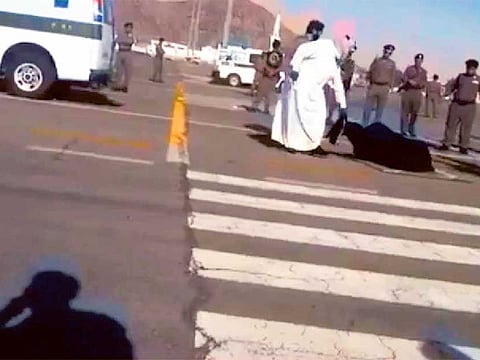Saudis worried about image of their country after beheading video
Leaked beheading video sparks comparison with Daesh in social media

Beirut: In a recent video from Saudi Arabia, three uniformed security officers and a professional swordsman in a white gown struggled to placate a woman cloaked in black and sitting in the street. A Saudi court had convicted her of murder, but she was proclaiming her innocence.
Then the officers stepped back, the swordsman took aim and the woman shrieked and fell silent as he struck her neck with his blade, three times in total. Medics wearing white gloves tended to the body, and the swordsman wiped his blade with a cloth.
The video was distributed by human rights activists and posted online after the execution in Makkah on January 12, shedding light on the way Saudi Arabia applies the death penalty.
On Sunday, Saudi news outlets reported that the authorities had arrested the man who had shot the video and planned to prosecute him. Although the reports did not specify what charges he faced, an Interior Ministry spokesman said such matters fell under the country’s law against cybercrimes.
Saudi Arabia is governed by a strict interpretation of Sharia. Some of its practices have come under greater scrutiny with the rise of Daesh extremist group in Iraq and Syria, which also claims to rule according to Sharia law and has shocked the world with videos of its fighters beheading captives.
The kingdom recently delayed the second round of the public caning of a writer sentenced to 1,000 blows for running a liberal website after his sentence was criticised by the US State Department and the United Nations. That followed an uproar caused by a video of the first round of the punishment that was posted online.
Many Saudis object to their country’s being compared to Daesh, saying that Saudi Arabia executes only those convicted of grave crimes, while the fighters of Daesh indiscriminately kill those who do not share their beliefs.
International human rights organisations have criticised the Saudi justice system, and two UN human rights experts called for a moratorium on beheadings in Saudi Arabia last year, labelling them “cruel, inhuman and degrading treatment.”
Although Saudi Arabia criminalises any words or acts that insult the Prophet Mohammad (PBUH), it condemned the deadly attack this month on the newspaper Charlie Hebdo in France and has joined the US-led air campaign against Daesh.
Still, some Saudis worry about how domestic practices affect their image abroad.
“You reach a stage where you can’t defend the country,” said Khalid Al Maeena, a social and media analyst who lives in Jeddah. “I can’t go on a platform in Europe and say that everything is hunky dory when someone is being lashed every Friday.”
Jamal Khashoggi, a Saudi journalist and commentator, said that while some Saudis saw the damage such practices caused abroad, the government faced little opposition domestically, partly because of the belief that Islamic punishments should be carried out in public.
“It is the Saudi Foreign Ministry that will face the heat, but locally we don’t have a problem with that,” he said of public executions.
Saudi Arabia, a country of 27 million, executed 87 people last year for crimes like rape, murder, armed robbery and drug trafficking, according to a count compiled by Human Rights Watch. It has executed 11 people so far this year.
While most executions are believed to be beheadings, the government does not usually disclose the method used.
The United States, by contrast, executed 35 people last year, according to the Death Penalty Information Centre, using methods that are not always flawless.
According to the state-run Saudi Press Agency, the executed woman was a citizen of Myanmar who had been convicted of severely beating her husband’s 7-year-old daughter, also from Myanmar, and violating her with a broomstick “without mercy or pity, which led to her death.”
In the video, which appeared to have been filmed with a mobile phone, the women repeatedly yelled, “I didn’t kill! I didn’t kill!” and “This is oppression!” in Arabic while the men positioned her for the blows of the sword.
The Saudi newspaper Okaz reported on Sunday that the police in Makkah had arrested a security officer who had filmed the beheading and that he would face both military and civilian justice.
Another Saudi newspaper, Al Riyadh, cited Lt Col Atta Al Quraishi, a spokesman for the Makkah police, as saying that the man would be turned over to the “relevant authorities.”
Sign up for the Daily Briefing
Get the latest news and updates straight to your inbox



